*Rrcc is a variant of Stop/DJVU. Source of claim SH can remove it.
Rrcc
Rrcc is a file-encrypting ransomware program that uses user files as a base for online money extortion. Rrcc blackmails its victims by demanding ransom for the decryption of the files that it had previously encrypted with a secret code.
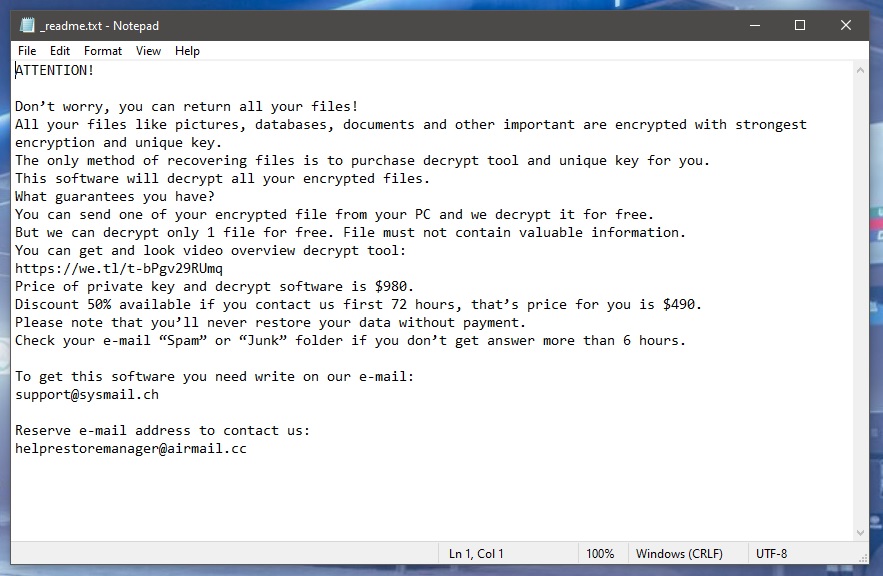
Rrcc is a dangerous program that can basically encrypt all the files you’ve been recently accessing. The term “ransomware” is used for all malware programs that can restrict access to something and ask you to pay ransom to give it back to you. The Ransomware subtypes are different. Some of them only block the screen of the infected device and don’t do anything to the data stored on it. Others leave the screen accessible but encrypt the files kept in the system with an algorithm that can only be reversed with a special decryption key. Rrcc falls in the second category and targets user files that are considered to be of great value for the victim. As soon as it encrypts them, this ransomware displays a ransom message on the screen of the infected computer and asks for a money transfer to send the needed decryption key. If you have recently been greeted by such a message, we suggest you read this post and take a look at the removal guide at the end. This can help you deal with the notorious infection and remove it from your computer.
The Rrcc virus
The Rrcc virus is a type of malware that limits web users from accessing the files stored on their system. The Rrcc virus works by secretly encrypting certain file types that are frequently accessed and demanding a money transfer in order to send the decryption key for them.
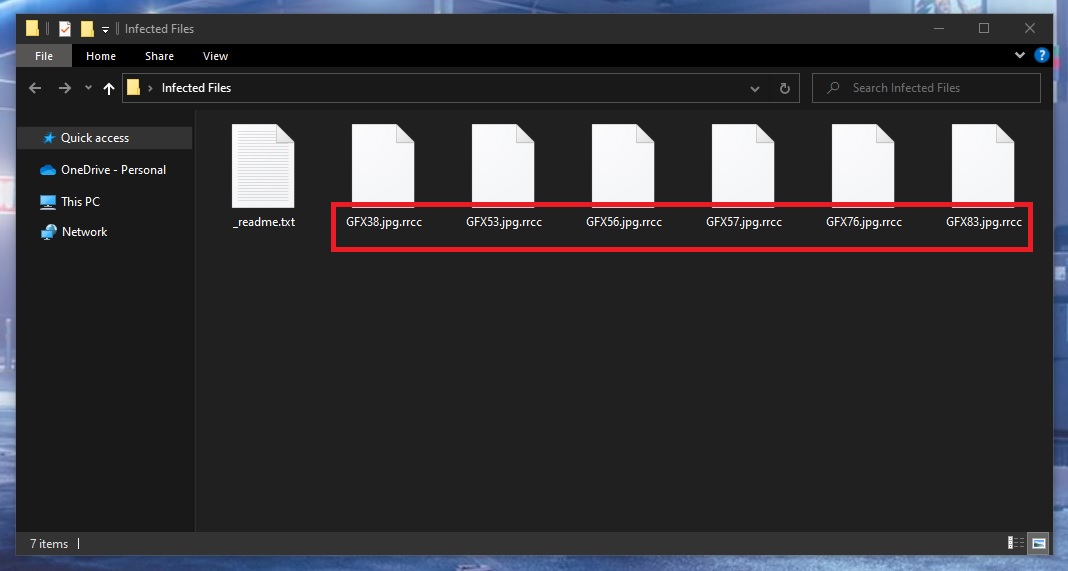
This file-encoding virus will normally infect the machine with the help of a Trojan horse virus. However, one careless click on a malicious link, a fake ad, or a spam message can also deliver the ransomware that’s why no one is fully protected against catching it. According to some recent statistics, most of the affected users either received a viral spam letter with a malicious attachment or have clicked on a fake ad.
The .Rrcc file encryption
The .Rrcc file encryption is a process that typically runs in the background of the system and shows no visible symptoms that can give it away. Therefore, the victims of the .Rrcc file encryption often have no clue about the attack until they are faced with the ransom message on their screen.
Simply deleting the ransomware virus doesn’t mean that the encrypted files will automatically be recovered. Therefore, the attack of a malicious program such as Rrcc, Zfdv, Rryy is one of the most worrying, precisely because such viruses and their effects are very hard to eliminate. In this situation, our advice is not to hurry with the payment of the demanded ransom, but to explore other opportunities. One of them may be to attempt to remove the contamination and minimize the harmful effects of the applied encryption with the help of a removal guide just like the one at the bottom of this article. One additional opportunity is to look for special software to fight such infections or to contact a security professional for assistance. In any case, all options must be considered carefully before you decide to risk your money.
SUMMARY:
| Name | Rrcc |
| Type | Ransomware |
| Danger Level | High (Ransomware is by far the worst threat you can encounter) |
| Data Recovery Tool | Not Available |
| Detection Tool | We tested that SpyHunter successfully removes parasite*, and we recommend downloading it. Manual removal may take hours, it can harm your system if you re not careful, and parasite may reinstall itself at the end if you don't delete its core files. |
*Rrcc is a variant of Stop/DJVU. Source of claim SH can remove it.
Remove Rrcc Ransomware

If Rrcc has already infected your PC, we recommend that you disconnect any USB drives or other external storage devices before beginning the removal process. It’s also a good idea to unplug your computer from the Internet to prevent the Ransomware from receiving instructions from its servers.
For the smooth completion of the next instructions, we also recommend that you open this removal guide on another device and follow it from there, or save these Rrcc removal instructions to your browser’s bookmarks, so you don’t have to seek for them every time the system restarts.
A Safe Mode restart is the last thing from this step. If you don’t know how to do it, simply click on this Safe Mode link and follow the steps described there. When you are done, come back to this page and proceed to step 2.

WARNING! READ CAREFULLY BEFORE PROCEEDING!
Read more details in the first ad on this page, EULA, Privacy Policy, and full terms for Free Remover.
*Rrcc is a variant of Stop/DJVU. Source of claim SH can remove it.
As a second step, open the Task Manager by using the combination of Ctrl + Shift + Esc or entering Task Manager in the Start Menu search field and clicking Enter. Select the Processes tab from the menu. Look for suspicious names in this list of processes that may be associated to Ransomware after sorting them by Memory and CPU use.
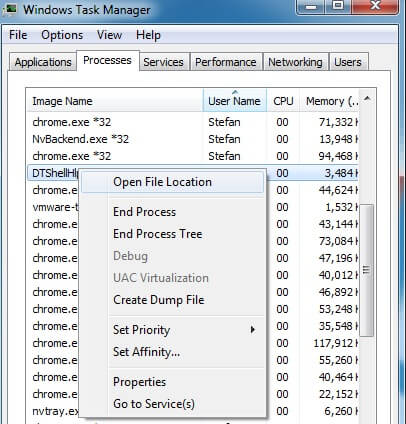
Look for additional information about any suspicious-looking processes online, then open the location folder of each of these processes by right-clicking on it and selecting Open File Location, then use the scanner below to scan the contents of that folder for malware.

If threats are found in the folder, you need to first end the process that is running by right-clicking on it in the Processes tab and selecting End Process. After that go to the File Location folder and delete the files that the scanner has flagged as dangerous.
As a next step, look for some possible unauthorized changes to your Hosts file using the Win key and R, and pasting the following command in the Run box:
notepad %windir%/system32/Drivers/etc/hosts
Hit Enter on the keyboard to run the command and open the Hosts file. Then, in the text, find Localhost and check what IP addresses are listed below. Any IPs that don’t appear trustworthy (like the ones on the image below) should be reported in the comments section of this guide, so we can take a look at them and give you some advice on what to do with them.
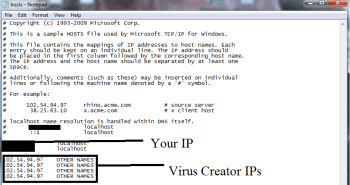
Next, in the Start menu’s Windows Search bar, type “msconfig” and press Enter from the keyboard. The “System Configuration” window will open on the screen. The items on the “startup” tab should be checked for anything unusual. Disable any startup items that you feel are linked to the infection by removing their checkmark, then, to save your changes, don’t forget to click “OK”.
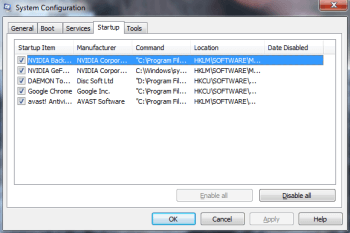

Read more details in the first ad on this page, EULA, Privacy Policy, and full terms for Free Remover.
*Rrcc is a variant of Stop/DJVU. Source of claim SH can remove it.
Secretly altering a computer’s registry allows malicious applications to remain undetected for as long as possible after being installed on the system. Therefore, you must use the Registry Editor to find and delete any files linked with Rrcc that have been placed on your computer by the threat. The infection will be totally eliminated from your computer as a result of this procedure. To access the Registry Editor, enter regedit in the Windows search bar and then press Enter on your keyboard.
Search for files linked to the infection by hitting the CTRL and F keys at the same time and opening a Find box. Next, type the name of the threat in the Find box and select the Find Next button to begin searching for ransomware-related files.
Attention! Manual removal of advanced malware threats like Rrcc may be challenging. If you have any reason to believe that the malware is still present on your machine, we suggest that you use the advanced malware removal application available on this website. Additionally, you may use this program to protect your computer against future malware attacks.
Aside from the Registry, the following five locations on a computer may also contain files associated with ransomware. So, we highly encourage you to go through the folders below and search for any new or unusual files. The following search keywords should be entered into the Windows Search bar to open each of them.
- %AppData%
- %LocalAppData%
- %ProgramData%
- %WinDir%
- %Temp%
Delete any files that contain code that may be harmful only if you are very certain that they are part of the danger. In order to delete any temporary files from your computer’s Temp directory, hold down the CTRL and A keys and then hit the delete key on your keyboard.

How to Decrypt Rrcc files
Non-ransomware experts may find it difficult to recover ransomware-encrypted data. In many cases, the decryption processes may differ depending on which ransomware variant was employed, making it more difficult to retrieve the data. To figure out which variant of ransomware has encrypted your files, look at the file extensions that have been appended to the encrypted data.
A thorough virus scan, using an anti-virus program, is required before any data recovery can begin. This is to ensure that the system is clean from any potential threats, and it is safe to begin looking into file recovery alternatives.
Next Djvu Ransomware
STOP Djvu is a ransomware variant that is causing trouble to a lot of online users globally. The .Rrcc suffix is often added to files encrypted by this virus. This malware often appends the .Rrcc extension to the files it encrypts. Although this is a new danger, decryptors like the one from the link below may still be able to help you retrieve your encrypted data:
https://www.emsisoft.com/ransomware-decryption-tools/stop-djvu
To begin decrypting the data, run the STOPDjvu.exe program you downloaded and installed on your computer as an administrator and carefully read the license agreement and any accompanying instructions. The program may not be able to decode data encoded using unknown offline keys or online encryption techniques, therefore successful recovery is not guaranteed in all circumstances.
We offer anti-virus software that can help you remove the Rrcc ransomware in case you find yourself in trouble. Our free online virus scanner is another tool that you can use to do a manual scan of any files you believe to be dangerous.



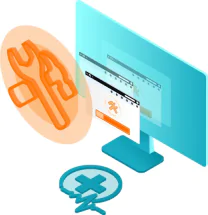
How to decrypt the files attacked by .rrcc extension ransomware. Is there any decryptor available?
Hi Akshay Pore,
there is a link at the bottom of the guide that can direct you to the decryptor. It will show you how your files are locked. If they are locked with Online ID, decryption is impossible, but if they are infected with an Offline ID, decryption may be possible.
can we decrypt if they are locked with online id
Hi, Sunny, ONLINE KEYS are UNIQUE for each victim and just like older versions, they are randomly generated in a secure manner and are impossible to decrypt without paying the ransom which is not advisable. That means for now, the only other alternative to paying the ransom, is to backup/save your encrypted data as is and wait for a possible future solution if encrypted with an ONLINE KEY.
I Cant remove the .rrcc, it still blocked my document
Hi Ryan,
did you go through the whole guide? At the bottom of the guide there is a link to the decryptor.